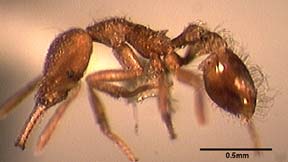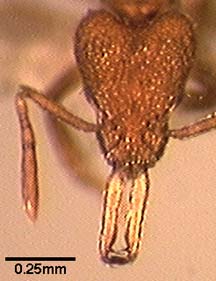Strumigenys lanuginosa Wheeler 1905
Dacetini, Myrmicinae, Formicidae, Hymenoptera, Insecta, Arthropoda, Animalia
John T. Longino, The Evergreen State College, Olympia WA 98505
USA.
longinoj@evergreen.edu
21 April 1997

Specimen: Costa Rica, Prov. Puntarenas: 19km S. Ciudad Neily, 20m (J. Longino 2658-s). INBIOCRI001281641. Image by J. Longino.
Identification
Apical fork of mandible with single intercalary tooth; mandible with single conspicuous preapical tooth near apical fork; gaster finely longitudinally striolate, opaque-sericeous throughout; gaster covered with dense brush of flagelliform setae.
Head length 0.55-0.60mm, mandible length 0.35-0.38, CI 79-80, MI 63-64 (n=5 workers from 2 localities; Brown 1961).
Range
Southern Mexico to Panama, Bahamas (where probably introduced; Brown 1961). Costa Rica: Atlantic and southern Pacific lowlands.
|

Specimen: Costa Rica, Prov. Puntarenas: 19km S. Ciudad Neily, 20m (J. Longino 2658-s). INBIOCRI001281641. Image by J. Longino. line drawing of worker face (from Brown 1962) |
Natural History
Brown and Wilson (1959) summarize the genus as follows:
"Widespread in tropics and warm temperate areas. Primarily forest-dwelling; some species occur in grassland and arid scrub. ... Nests mostly in soil and rotting wood; a few species live in arboreal plant cavities in tropical rain forest. Foraging hypogaeic to epigaeic-arboreal. Food: most species are collembolan feeders; a few are polyphagous predators or occasionally feed on sugary substances..."
lanuginosa occurs in wet and dry forest habitats. It inhabits leaf litter on the forest floor.
Selected Records
Winkler samples from Finca La Pacifica, 19km S Ciudad Neily.
La Selva: nocturnal forager in wet forest.
Literature Cited
Brown, W. L., Jr. 1961. The Neotropical species of the ant genus Strumigenys Fr. Smith: Miscellaneous concluding studies. Psyche 68:58-69.
Brown, W. L., Jr. 1962. The neotropical species of the ant genus Strumigenys Fr. Smith: Synopsis and keys to the species. Psyche 69:238-267.
Brown, W. L., Jr., Wilson, E. O. 1959. The evolution of the dacetine ants. Quarterly Review of Biology 34:278-294.
 Go back to top
Go back to top

